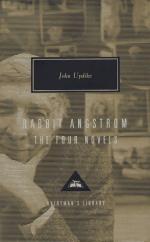|
This section contains 1,214 words (approx. 5 pages at 300 words per page) |

|
Updike has been a professional writer for two decades. His first decade's work, for the most part, records the strife, observation, and feeling of that pre-twenty year old wherein nostalgic recollections of boyhood are transmuted by an adult's imagination and youthful autobiography is altered into art…. [His] youthful memory informs almost all the fiction of [the] 1955–65 decade.
Updike wrote [the] Foreword to Olinger Stories in 1964 with the intention of saying farewell to Pennsylvania and to his boyhood memories. Except for brief returns in Rabbit Redux (1971) and Buchanan Dying (1974), he has sustained that intention. After the novel, Of the Farm (1965), his favorite fictional locale moves from Pennsylvania to New England (often Tarbox) and his themes no longer reflect boyhood recollections but adult concerns. In the decade 1965–76 the tensions of marriage, the process of aging, and the varied losses of "faith"—religious, political, sexual—become his central themes. (pp. 219-...
|
This section contains 1,214 words (approx. 5 pages at 300 words per page) |

|


